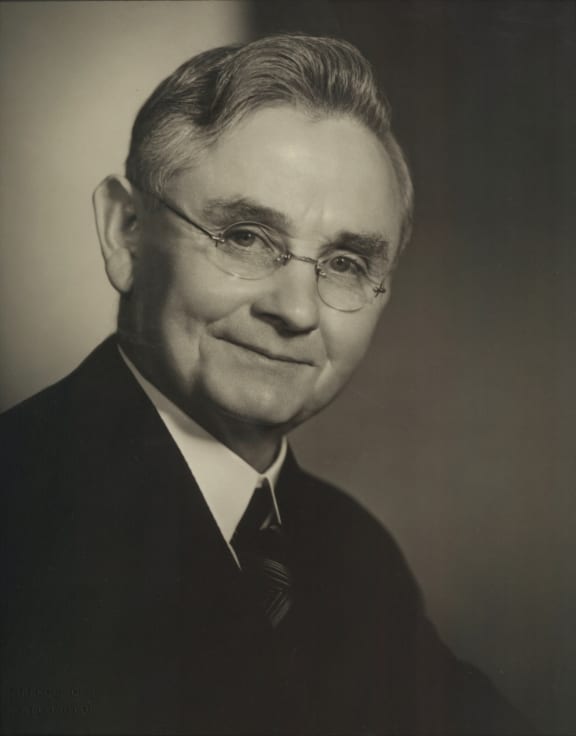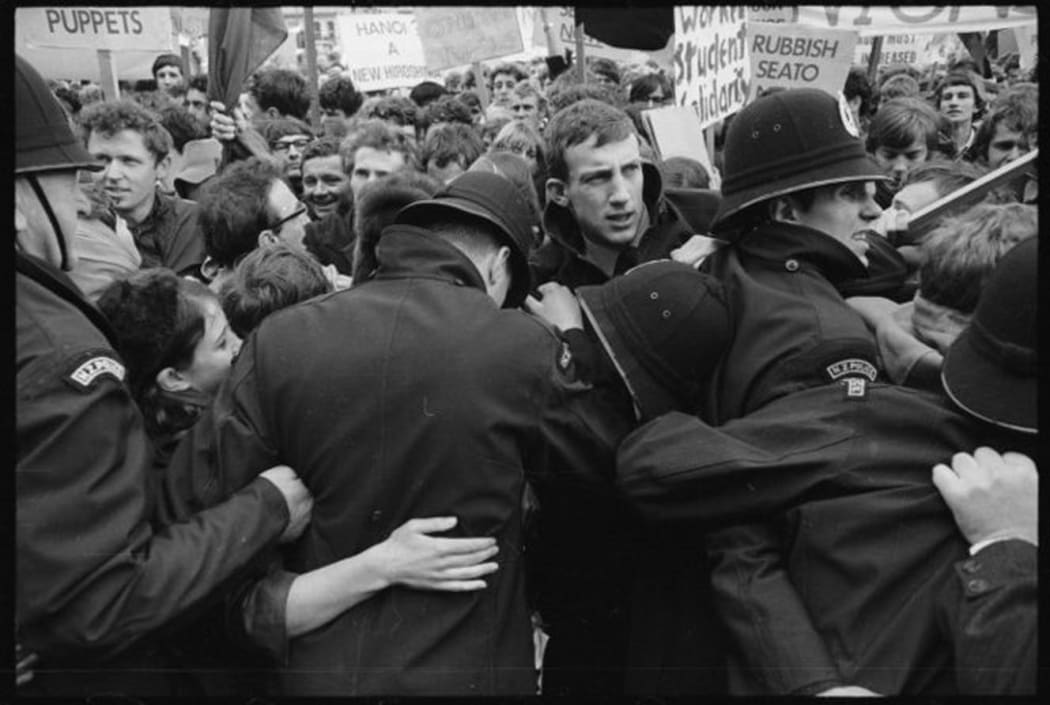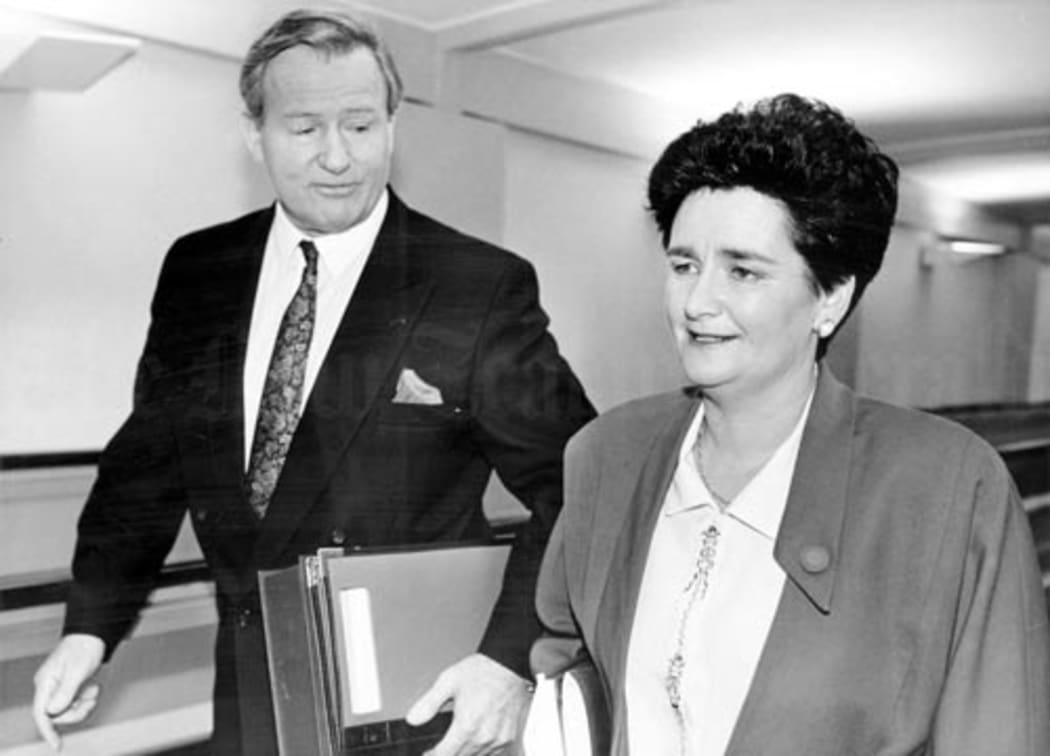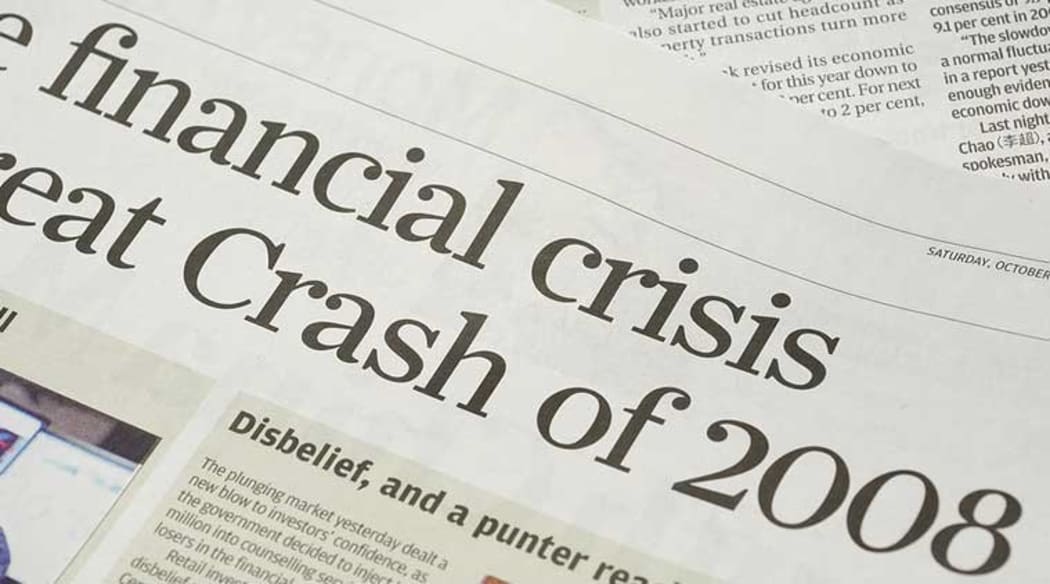It's either economic astrology or just very bad luck, and it's definitely not any sort of economic certainty or rule. But it is the great curio of New Zealand's economic history: we have had a recession every year ending with 8 since the 1968.

An influenza medicine depot in Christchurch for "poor" people. Taken by an unknown photographer 4 December 1918. Photo: Alexander Turnbull Library Ref: 1/1-008542-G.
So far, 2018 looks like being the first '8' year not to have a recession in 50 years. There's still a remote chance the September and December quarters could register two consecutive quarters of negative growth, but most economists think it's unlikely.
They're saying: 'This time is different'
But we do know that 'this time is different' are the four most dangerous words in economics.
So what is so special about years ending in '8'.
I got to thinking about the curse of the 8s while I was at a commemorative march in Wellington to mark 100 years since the end of the first world war. One soldier in the march was a woman dressed as a nurse from 1918. She had the grimmest look.
November 1918 should have been a great celebration. Instead, it was desperately tragic time. A flu epidemic swept through the country, killing more than 9,000 people – almost half the 18,000 New Zealanders who had died in the war itself.
It was a more positive time economically, although things were about to get worse.
“The war in economic terms for agricultural producers had been a pretty good thing," said Former Reserve Bank economist Michael Reddell.

Economist Michael Reddell. Photo: Supplied
“The British Government did a deal with the NZ Government where they basically bought all we could supply and that ran on for a couple of years after the war.”
But then the troops returned and Britain stopped buying our produce. The next 10 years were tough.
1928
By 1928, the new (but old) Prime Minister Sir Joseph Ward had promised to borrow money from Britain to stimulate the economy. Except he stuffed it up in the announcement.
"It’s said he misread his notes. He intended to say he would borrow 7 million pounds, but ended up saying 70 million pounds. There was clearly a lot of ongoing demand for infrastructure spending, for roads, railways and a sense that the economy, even though we were among the richest countries in the world, wasn’t growing anywhere near as strongly as it had been in the pre-war decades," said Reddell.
Then came the Great Depression through the early 1930s. Government debt rose to over 200 percent of GDP. Unemployment rose over 30 percent. For comparison sake. Our debt is now around 20 percent, which the Government thinks is still too high. Unemployment is just 3.9 percent.
The economy started to recover around 1934 and got more stimulus when the first Labour Government was elected in 1935. Michael Joseph Savage borrowed money from the Reserve Bank – classic money printing – to finance the first state house building programme.

Michael Joseph Savage Photo: Wikimedia Commons
1938
But all that money printing and spending also meant we sucked in a lot of imports we couldn’t afford. We had a fixed exchange rate so more imports than exports meant we ran out of foreign exchange.
At the end of 1938 the Government had to slap on foreign exchange controls because they were literally at the point of running out of foreign reserves. At the beginning of 1939 New Zealand was on the verge of defaulting on its debt in the UK. Walter Nash had to make trips to London.
"The only reason the Brits agreed to roll over the debt was that they recognised the war was six months away. They realised they couldn’t afford to have an ally defaulting at a point when they’d need us involved in the war in a very short period of time,” said Reddell.
Yet again, our economy was saved by the war.
The Government increased taxes to pay for the war and never dropped them back. By the end of WWII we’d paid off the national debt.
1948
The wool industry was booming at the start of the Cold War in the lead-up to the Korean war. 1948 was the last good '8' year before 2018.
Reddell said it was so good that New Zealand and Australia actually donated money to Britain.
“It was presented as New Zealand and Australia, which hadn’t suffered as badly as Britain from the war, giving that money back to the UK."
1958
Wool prices slumped after the end of the Korean war and New Zealand was back in trouble again
“That was the year of the 'Black Budget'. Labour came to power at the end of 1957. The Balance of Payments had been under severe pressure as the commodity prices had fallen and Labour probably overdid the adjustment. “
Labour's failure with the 1958 'Black Budget' meant it struggled going into the 1960 election, which it lost to National led to Keith Holyoake.
National's intake of new MPs that year included Robert Muldoon.

Robert Muldoon Photo: Wikicommons
By 1967 he was Finance Minister and the economy had begun turning ugly again.
1968
1968 was the first in the string of years ending in 8 that had a recession, right up to today.
Wool prices collapsed and our exchange rate hadn’t moved for 18 years.
Reddell said New Zealand actually had to go cap in hand to the IMF to get money.
“They devalued the by now NZ$ against the pound and the US$, but also had to put in place a lot of austerity measures, removing subsidies on a variety of things. They even went to the stage of instructing banks to cut all credit limits by 10 percent overnight. At the time they were business overdrafts, not mortgages, but it was a very significant adjustment,” he said.

Protests at the opening of Parliament, 1968 Photo: Public Domain / Evening Post newspaper, ATL
1978
By 1978 Robert Muldoon was in power as both Finance Minister and Prime Minister. He faced a recession.
“We’d come off this period when Britain had gone into the EU. The first oil shock. Big falls in commodity prices and the Budget deficit under the 1972-75 Labour Government had really blown out,” said Reddell.
1988
10 years later New Zealand was mired in the fallout from the Stock market crash of 1987 and the end of a commercial lending property boom. And it kept getting worse over the next few years. By 1991 National was in power and Ruth Richardson as Finance Minister delivered 'The Mother of All Budgets' which cut benefits.

The Mother of all Budgets Photo: Te Ara / Public Domain
1998
Michael Reddell saw a combination of factors driving the recession of 1998.
“In 1998 we had a combination of things. There was the Asian financial crisis. We caught the backwash of this. Korea was a major market, particularly for Tourism. There was also a serious drought that year.”
2008
Drought was also more important than we remember in the 2008 recession, which actually began just before the Global Financial Crisis started.
But Reddell said panic quickly set in.

The GFC Photo: wikipedia
“The real thing was fear. No one knew which bank was sound. The banks cut their lines on each other. Their willingness to take credit on each other and on their customers and that flowed very quickly through to their customers. Businesses being reluctant to spend and invest, and unemployment rising quite quickly.”
It was an ugly time.
Some days were desperate. Especially when Australia decided to introduce a deposit guarantee at short notice. On one Sunday morning in October 2008, Michael Reddell was attending church. He was working as a special advisor in Treasury at that time. He got a phone call telling him to come into work.
“The morning when the Prime Minister was about to launch her election campaign. She was intending to announce we were going to do some work on this issue. They were rung that morning by Kevin Rudd and told he was going to announce a deposit scheme that afternoon. Ministers and we as officials recognised that we couldn’t really allow New Zealand banks to open the following day unguaranteed if the Australian banks were guaranteed. There would have been too much of a risk of a run on New Zealand institutions. The Reserve Bank, to its credit, had it in place the following morning.”
So here we are the end of that century of eights.
Is this time going to be different? It’s possible. The September and December quarters haven’t been reported yet and most economists don’t see a recession.
But Reddell suggests we're not out of the woods yet. He points to Brexit, the Italian/Brussels Budget showdown and US/China tensions.
"There are both domestic and international issues that still pose a bit of a risk."

Photo: Ngā Taonga Sound & Vision
Two Cents' Worth is a co-production of RNZ and Newsroom.

